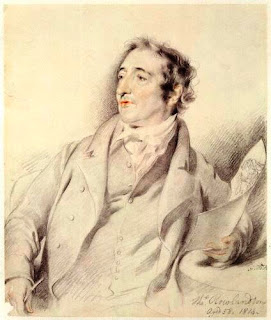The author of The Tour of Dr. Syntax in Search of the Picturesque was William Combe (1741 – 1823) , whose real life is more interesting than most of his fictional subjects. Combe earned his living for a long time as a writer for various publications in London; many of his works were published anonymously, as was the custom for many periodicals of the time. Some sources term him a “hack,” perhaps meaning he wrote whatever assignments he was given or more probably that his work was of undistinguished literary merit.
His origins are foggy, but he did attend Eton and was a classmate of such luminaries as Charles James Fox and William Beckford. He inherited a small fortune which he squandered, and later, he apparently served in several capacities from servant to soldier. He was a law clerk in London, a student of the law and a bookseller, but nothing kept up with his expenses. He published some satirical works but soon his debts sent him to the King;s Bench Prison where he lived from about 1780 to his death. He wrote pamphlets, treatises, satires for Ackermann’s publications, from unsigned pieces to the famous Tours and other works that were popular and brought him some measure of fame. Apparently he remained in his relatively comfortable quarters at the prison and received payment by means of an account from which he could draw small amounts rather than directly as fees, which might have been taken away and applied to his a accumulated debts. It seems he was satisfied with his prison life — he was free to come and go most of the time. Strange, but his choice!
Artist Thomas Rowlandson (1756-1827) worked for Rudolph Ackermann for more than a quarter century, illustrating many of his publications and providing many caricatures sold in Ackermann’s shop. Dr. Syntax brought him great success, building on his considerable reputation. He provided a drawing or two for each installment of Combe’s poem, and other illustrations for Combe’s subsequent works. We also know him as an irreverent social and political critic whose drawings were both popular and biting.
(Dr. Syntax is off to begin his search, riding his mare Grizzle and looking for scenes to sketch…)
…Syntax, with his scheme besotted,
Along the village gently trotted…
Through the deep vale, and up the hill.
By rapid stream or tinkling rill.
Grizzle her thoughtful master bore.
Who, counting future treasure o’er.
And, on his weighty projects bent,
Observ’d not whither Grizzle went. …
But, ah ! too soon the vision passes,
Confounded by a pack of asses !
The donkeys bray’d ; and lo ! the sound
Awak’d him from his thought profound;
And as he star’d, and look’d around,
He said — or else he seem’d to say —
” I find that I have lost my way.
Oh! what a wide expanse I see,
Without a wood, without a tree!
Thus as he pondered what to do,
A guide-post rose within his view ;
And, when the pleasing shape he spied,
He prick’d his steed, and thither hied ; …
The mangled post thus long had stood,
An uninforming piece of wood;
Like other guides, as some folks say.
Who neither lead, nor tell the way.
The Sun, as hot as he was bright.
Had got to his meridian height;
Twas sultry noon — for not a breath
Of cooling zephyr fann’d the heath;
When Syntax cried — ” ‘Tis all in vain
To find my way across the plain;
So here my fortune I will try.
And wait till some one passes by…
But, ah! how false is human joy! When least we think it, ills annoy:
For now, with fierce impetuous rush,
Three ruffians issued from a bush;
One Grizzle stopp’d, and seiz’d the reins.
While they all threat the Doctor’s brains.
Poor Syntax, trembling with affright.
Resists not such superior might.
But yields him to their savage pleasure.
And gives his purse, with all its treasure.
Fearing, howe’er, the Doctor’s view
Might be to follow and pursue
The cunning robbers wisely counted
That he, of course, should be dismounted;
And still that it would safer be
If he were fastened to a tree.
Thus to a tree they quickly bound him;
The cruel cords went round and round him;
And, having of all power bereft him.
They tied him fast — and then they left him.
By the road side, within the wood,
In this sad state poor Syntax stood.
End of Canto II
to be continued




